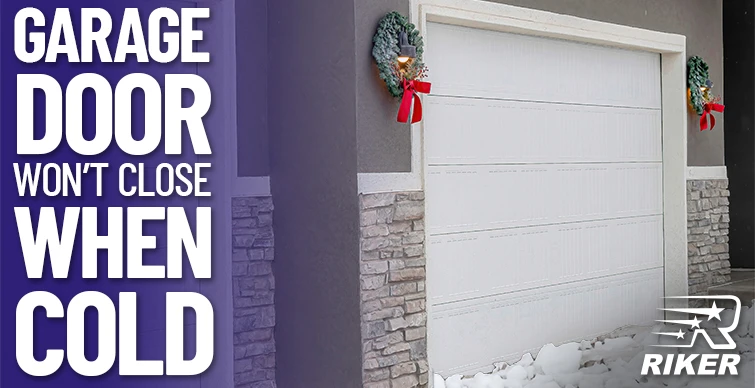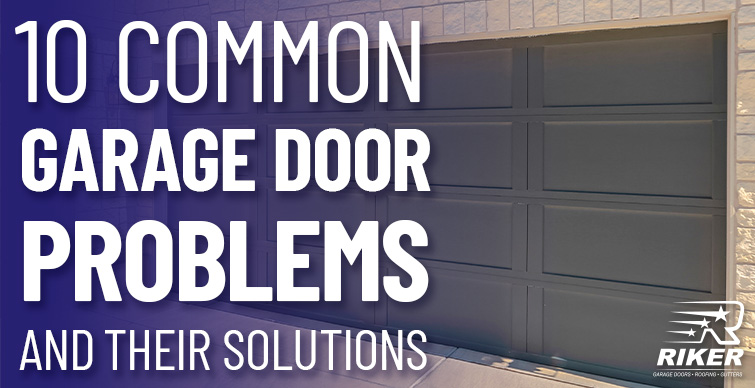A damaged garage door may reduce the appearance of a home or affect its safety and convenience. Damage can include problems that are easy to see, like a dent or rusting hardware. Or the issue could stay hidden as mechanical complications that make its operation unreliable. Understanding how damage commonly occurs can help homeowners protect their doors from harm and avoid the expense of garage door repairs and replacements.
Table of Contents
1. Accidental Impact
Accidental impacts can happen when drivers do not allow the door to open adequately before attempting to drive through. A mistaken double tap of a remote or inattention could cause the garage door to close before the car clears the opening. Damage can occur if a distracted driver does not stop in time or forgets to look before reversing out of a closed garage.
Any impact, even a minor event, could cause damage. It is easy to know it is time to call for repair with a dented or buckled door. Some damage may not show on the exterior but will become apparent when operating the door. The damage may be unnoticed at first but worsen through use. Preventing accidents often relies on people avoiding distractions when using the garage or driveway.
2. Weather Exposure
Impact damage does not always have a human cause, and it can be difficult or impossible to prevent. Airborne debris during severe weather can leave dents, dings, and worse. Storms can cause broken windows, remove doors from their tracks, and make them warped or otherwise unusable. Damage caused by nature can occur during storms like hurricanes and tornadoes, but it is also an everyday concern.
Wet and humid conditions can cause doors to warp or become vulnerable to wood rot. Excessive heat and sun exposure can also cause the wood to crack. Preventative measures like sealing the surface with paint and other finishes can reduce these risks.
Cold temperatures can thicken the lubricants used to keep the door operating smoothly. Thick lubricants create sticky surfaces that cause the garage door to struggle to open because the rollers cannot move through the track. The springs that hold the door in place and make it easier to operate can also become brittle or break when lubricants are less effective.
3. Lack of Maintenance
Regular garage door maintenance is essential to keep your garage doors functioning properly and prevent unexpected breakdowns. Scheduling these appointments is necessary for home security, to prevent personal injury, and to avoid door damage. With Riker, our annual maintenance services inspect all door components to ensure they work correctly or replace them if they do not. A technician will also clean and lubricate all moving parts and replace anything beginning to rust.
Annual service checks, cleaning, and lubrication will help but are not all that homeowners should consider. Since accidents, weather events, and other issues can happen, maintenance needs can occur at any time. Adequate maintenance should include a yearly visit and additional appointments if operational concerns arise. Waiting for an annual visit to address a maintenance problem could cause extra damage and more expensive repair bills.
4. Broken Springs
Broken springs can prevent a garage door from opening, and consistently opening the door with non-working or poorly working springs can wear out the motor. Broken springs can require people to open their garage door manually, but doing so has risks. The door will be heavier than usual to lift, and the strain of lifting it can cause people to lean in and bend or otherwise damage the panels. The track or roller could become damaged if the door does not open evenly.
Garage door springs also help to keep an open door in place. Without support, the broken springs could cause the door to drop unexpectedly. The sudden closure could cause injury or damage to anything in its path. It will also cause damage to the door that could be excessive enough to require replacement.
5. Worn Rollers and Hinges
Worn rollers and hinges can cause garage doors to come off their track. Rollers reduce friction as the door opens and closes. Damaged rollers will not help adequately and may cause excess wear to the track. A garage door will not open, close, or stay securely in place if the hinges and rollers weaken. Damaged rollers and hinges can cause the door to drop unpredictably.
Vehicles can become trapped in the garage if a door comes off the track while the car is inside. The need to use the car immediately may cause people to damage or destroy their door, the track, and other parts if they cannot resolve the problem.
6. Track Misalignment
A track misalignment can also cause a door to become impossible to open or close and may make it drop without warning. Sudden drops and straining to open a misaligned door can cause damage to the track and the door. Forcing open a door can cause damage by warping or bending the door or denting a panel.
Misalignments have many causes. Mechanical issues like broken cables, loose tracks, or worn rollers can cause the problem. Accidents with a vehicle often cause alignment issues, even if the impact is minimal. Dirt in the track, a lack of lubrication, and foreign items blocking the roller path could also cause misalignment.
7. Opener Malfunctions
Garage door opener malfunctions can lead to the same risks as the other previously mentioned mechanical concerns. The door may not stay open as expected and could drop without warning. The extra effort of manually opening it may cause it to come off the track. The track could become bent, and the panels can experience dents and additional damage.
Malfunctions related to the opener could begin with the remote, the motor, or mechanical components. Something as seemingly insignificant as dirt covering the sensor eye could occur. Non-working openers could have a wiring problem. Self-diagnosing the issue can be a challenge. The problem will require manual door operation until an issue diagnosis and repair occurs.
8. Aging and Material Deterioration
Annual maintenance lengthens the life span of most parts, but it cannot make anything last forever. All parts eventually need replacement because of their age and condition. Most garage doors typically last about 25 years when properly maintained. Rollers and tracks, depending on the material, can last 10 – 20 years. Springs usually need replacement every five to seven years. Cables can last a decade.
How much use a garage door experiences, the quality of the installed parts, and the level of maintenance received all affect the life span of the door. Additional issues like vehicle impacts and faulty materials can cause items to need replacement sooner. Professional maintenance service checks can identify problem components early to prevent any added damage that can happen if a part fails.
Prevent Garage Door Damage Before It Happens
At Riker Home Services, we help homeowners in Plano and the surrounding area protect their garage doors from costly damage. Scheduling annual garage door maintenance is one of the best ways to catch potential issues early and extend the life of your door. Our 16-point checkup includes inspecting key components, testing safety mechanisms, and lubricating moving parts to ensure smooth operation and avoid unexpected breakdowns.
In addition to maintenance, we provide emergency garage door repair services and garage door replacement for worn-out or damaged systems. Our team also offers storm damage cleanup, roofing services, and gutter cleaning to help protect every part of your home.
Contact Riker Home Services by calling (469) 551-3473 today to schedule your garage door maintenance.


